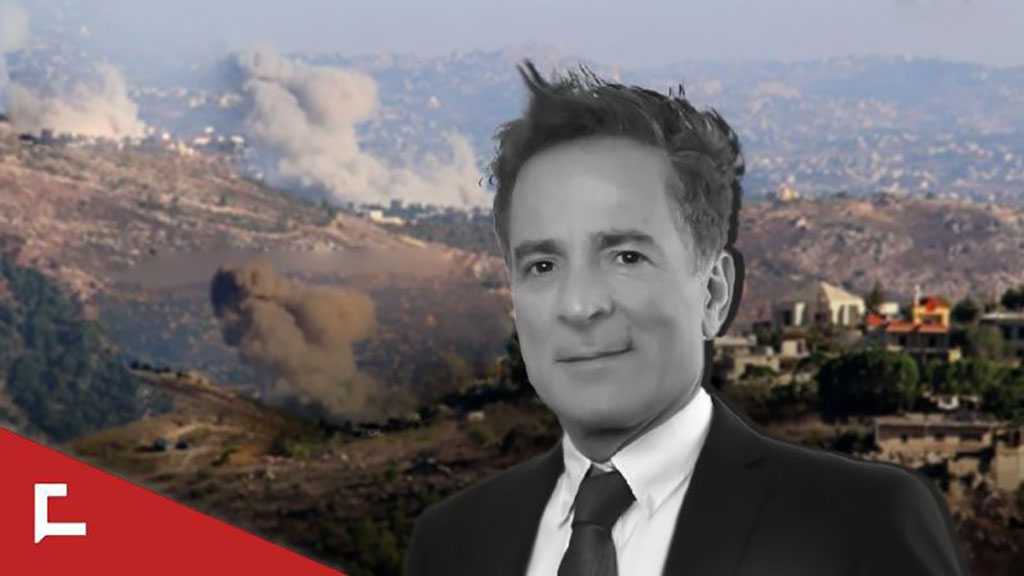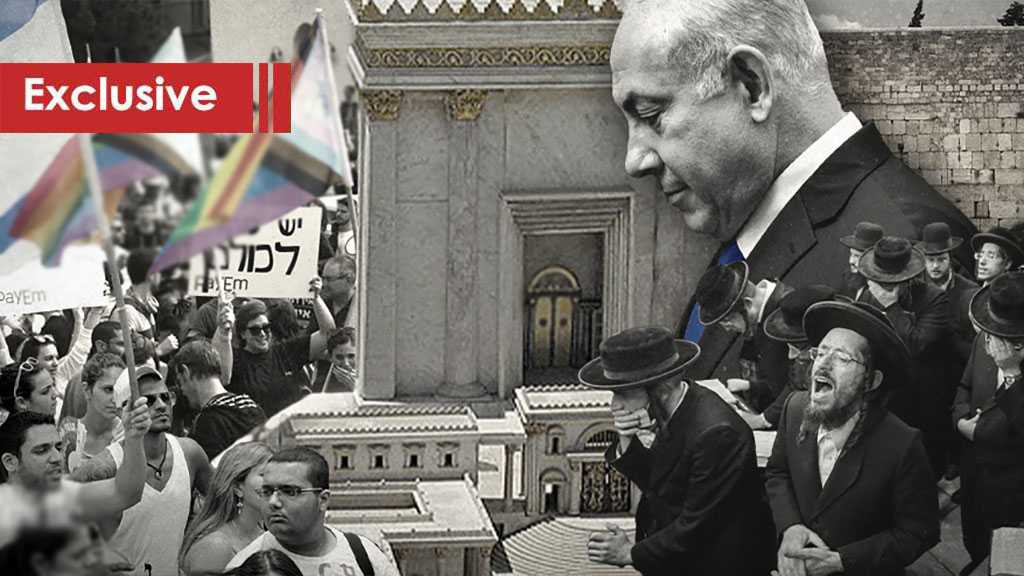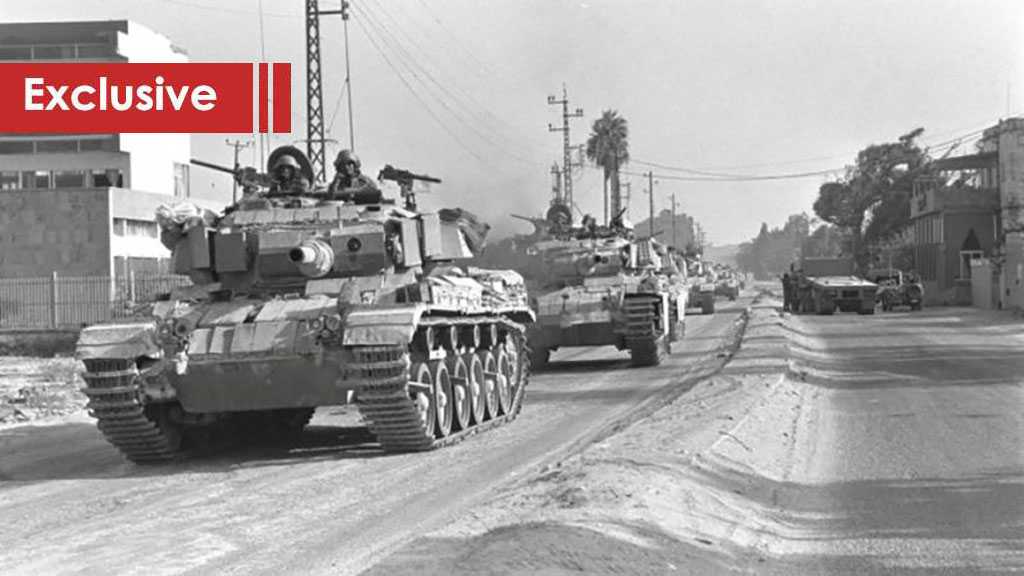
Sayyed Yasser al-Moussawi: Faith Keeps Nation Standing

Siraj Kobeissy
They are the defenders of the country; they defeated the so-called invincible army; their names are chanted in the memory of their victories against the enemy.
They are the resistance fighters - the Victorious - al-Ghaliboun.
For the second year in a row, part of their many stories was displayed in a high- quality Lebanese production series, which was well received, especially on the popular level.
The series-shooting sets of al-Ghaliboun II took place in many villages of South Lebanon, including Iqlim al-Tuffah, in an attempt to reflect as much as possible the true atmosphere from the occupation era.
Different stories of resistance fighters, martyrs and civilians living in the then occupied territories were demonstrated, on top of which was the story of Martyr Leader, former Hizbullah Secretary General Sayyed Abbass al-Moussawi; whose role was performed by none other than his own son; Yasser Abbass al-Moussawi.
Also, a great deal of talent came into view while actors played the roles of "Israeli" soldiers, and Lebanese agents who served in the Lahd Army (the Lebanese pro-"Israeli" army in South Lebanon). Agent Jalbout, a major character in the series renowned for his horrific behavior and inhumane treatment to civilians, reminded the people of the true image which not all people knew.
People of the South Remember their Calamities
Um Mahmoud, a southern Lebanese lady who witnessed the "Israeli" occupation since 1982, recalled how she once encountered agent Jalbout, and how he viciously treated her.
"We were on our way from Beirut to South Lebanon, when we were intercepted by a checkpoint that came out of nowhere," Um Mahmoud told moqawama.org.
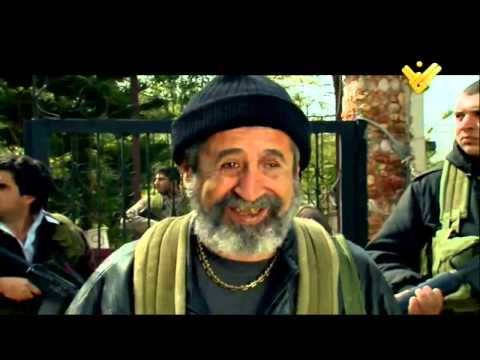 "Then all of a sudden, a very ugly strange man came, forced us out of the car, insulted us and the resistance, and ordered some of the soldiers who were with him to search us. We were stripped out of our dignity before we were allowed to continue our destination," she added.
"Then all of a sudden, a very ugly strange man came, forced us out of the car, insulted us and the resistance, and ordered some of the soldiers who were with him to search us. We were stripped out of our dignity before we were allowed to continue our destination," she added.
On al-Ghaliboun series, she (the southern woman) believed that the actor who played Jalbout's role perfectly earned it, as the character shows how he and other "Israeli" agents used to treat the people suffering the harshness of occupation.
On another hand, Hanaa, the wife of the Resistance martyr Asa'ad Berro, whose character was played in the series as well, told moqawama.org how touched they were to be reminded of the situation.
"Although I lived in Beirut, not in the occupied territories, I always lived the glories of this path while my late husband, self-sacrifice Martyr Asaad was in the fire line," she said.
She believed that al-Ghaliboun II series gave great deal to the role and performance of the resistance, yet it wasn't able to fully reflect the true image.
However; Hanaa noted that many of the people she knew, who had no idea about the occupation and the resistance operations, were impressed, and were very keen on learning more.
"The performance of al-Ghaliboun II was better than that of the first part, as more details were looked into, and hopefully in future projects more details would be prevailed in service of this message," she further added.
Yasser al-Moussawi in His Father's Shoes
From the heart of the resistance life, was the surprise of this part i.e. the appearance of Sayyed Yasser al-Moussawi in the role of his father.
Touched by the details of the resistance life revealed, Sayyed Yasser noted that this is the first time a drama documents the history of the resistance, whether in its radical and popular events, or details related to its establishment.
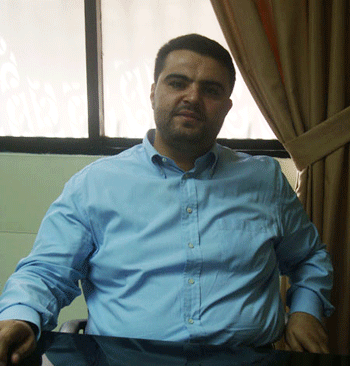 "The resistance was established in 1982, and until today; some 30 years after, I believe that there are almost two generations who don't know the resistance. They only knew it at the peak of its victories, but they were unaware of the beginning of the resistance and the calamities it faced to reach today's victories," he expressed to moqawama.org.
"The resistance was established in 1982, and until today; some 30 years after, I believe that there are almost two generations who don't know the resistance. They only knew it at the peak of its victories, but they were unaware of the beginning of the resistance and the calamities it faced to reach today's victories," he expressed to moqawama.org.
"The second stage, which is more important, was when the resistance launched its military operations. This stage, when the resistance was able to defeat the "Israeli" enemy, was a very important and delicate one, and it was about time to be brought to the spot light," he went on to say
Sayyed Yasser clarified that the second part of al-Ghaliboun covers the timeline until 1992; the martyrdom of Sayyed Abbass al-Moussawi.
He highlighted that the series was able to demonstrate facts of the resistance's operations, to the extent that some people wondered whether some of the scenes were acted or were from the resistance's video archives.
"The viewers were very touched by the scenes, especially that most of them did not face the vicious calamities. I myself lived in a major part of that stage, and I remember it very well."
The son of the late Hizbullah Secretary General clarified that "although they tried their best, yet al-Ghaliboun only demonstrated around 70% of what was really happening at that stage; for there were many disgraceful practices the occupation and its agents used to do; things that cannot be easily told." he added.
With the issue of bringing in the character of Sayyed Abbass al-Moussawi to al-Ghaliboun II series, Sayyed Yasser recalled how the organizers and producers asked him to help in conveying details and information related to Sayyed Abbass.
"I told them I was ready to offer everything I have when it comes to Sayyed Abbass, yet it was not mentioned that I would play the role of my father. I, however, urged the directors that the actor that would play the role of Sayyed Abbass should be fit to the role," Yasser al-Moussawi iterated.
"At then, they suggested that I play the role of Sayyed Abbass. My answer was "absolutely not", because even if I look like Sayyed [Abbass], that doesn't mean I am able to give the desired results in acting his role."
He also explained that "as they insisted on the issue, I gave it up to His Eminence the Secretary General of Hizbullah His Eminence Sayyed Hassan Nasrallah, and said I'll do whatever he sees best. Furthermore, he pointed out that " he had no previous experience in the world of acting."
"I was expecting a rejection from His Eminence, until I was surprised that he encouraged me to take the part."
"I thought that this was an adventure, and so I started on one condition; if my performance from the first scene was not as good as desired, then I will withdraw from the whole scenario," he added.
"The director, Ridwan Chahine, and the producers were terrified the performance won't be as wanted, and so they would have to find a replacement. However; God willing I was able to act the scenes in a good way, only because I knew Sayyed Abbass up close and I lived with him, and so I know details of his character."
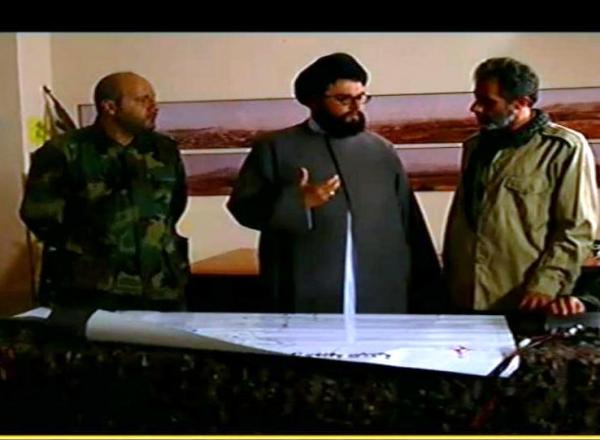
"Another condition was that I refused to act any scene for Sayyed Abbass when he was on stage, because I knew that I would not reflect the true image and spirit that he used to deliver in his words."
Moreover, the new insider to the acting world unveiled to moqawama.org that he refused to act any scene for Sayyed Abbass on stage. "I am sure that I would not reflect the true image and spirit that he used to deliver through his words."
Remembering details of the acting set, Sayyed Yasser stressed, "The role of Leader martyr was taken by full accuracy and delicacy, to insure that the scenes were shot exactly how they were in reality, except for some scenes that faced technical issues."
"It was a great experience that took us back to the early days of the resistance," he stated, describing how he was entrusted with his father's position and was able to experience what Sayyed Abbass felt at many stages of the resistance's developments and achievements.
Furthermore, Sayyed Yasser expressed H.E. Sayyed Hassan Nasrallah's content with his performance and that of the whole series.
"After couple of episodes to the beginning of the series, Sayyed Hassan Nasrallah told me he was very pleased with my performance; as I was about to introduce Sayyed Abbass's character to two new generations."
Sayyed Yasser hoped that more drama series would be performed to give the resistance its rightful image, and spread to the world what it has really done for the nation.
It is a matter of faith that keeps the nation standing. The anti-"Israeli" popular movement in Lebanon was the threshold of today's victories; and as the nation is committed to resistance, so is the resistance committed to protecting them to always remain al-Ghaliboun - the Victorious.
Source: moqawama.org
They are the defenders of the country; they defeated the so-called invincible army; their names are chanted in the memory of their victories against the enemy.
They are the resistance fighters - the Victorious - al-Ghaliboun.
For the second year in a row, part of their many stories was displayed in a high- quality Lebanese production series, which was well received, especially on the popular level.
The series-shooting sets of al-Ghaliboun II took place in many villages of South Lebanon, including Iqlim al-Tuffah, in an attempt to reflect as much as possible the true atmosphere from the occupation era.
Different stories of resistance fighters, martyrs and civilians living in the then occupied territories were demonstrated, on top of which was the story of Martyr Leader, former Hizbullah Secretary General Sayyed Abbass al-Moussawi; whose role was performed by none other than his own son; Yasser Abbass al-Moussawi.
Also, a great deal of talent came into view while actors played the roles of "Israeli" soldiers, and Lebanese agents who served in the Lahd Army (the Lebanese pro-"Israeli" army in South Lebanon). Agent Jalbout, a major character in the series renowned for his horrific behavior and inhumane treatment to civilians, reminded the people of the true image which not all people knew.
People of the South Remember their Calamities
Um Mahmoud, a southern Lebanese lady who witnessed the "Israeli" occupation since 1982, recalled how she once encountered agent Jalbout, and how he viciously treated her.
"We were on our way from Beirut to South Lebanon, when we were intercepted by a checkpoint that came out of nowhere," Um Mahmoud told moqawama.org.
 "Then all of a sudden, a very ugly strange man came, forced us out of the car, insulted us and the resistance, and ordered some of the soldiers who were with him to search us. We were stripped out of our dignity before we were allowed to continue our destination," she added.
"Then all of a sudden, a very ugly strange man came, forced us out of the car, insulted us and the resistance, and ordered some of the soldiers who were with him to search us. We were stripped out of our dignity before we were allowed to continue our destination," she added.On al-Ghaliboun series, she (the southern woman) believed that the actor who played Jalbout's role perfectly earned it, as the character shows how he and other "Israeli" agents used to treat the people suffering the harshness of occupation.
On another hand, Hanaa, the wife of the Resistance martyr Asa'ad Berro, whose character was played in the series as well, told moqawama.org how touched they were to be reminded of the situation.
"Although I lived in Beirut, not in the occupied territories, I always lived the glories of this path while my late husband, self-sacrifice Martyr Asaad was in the fire line," she said.
She believed that al-Ghaliboun II series gave great deal to the role and performance of the resistance, yet it wasn't able to fully reflect the true image.
However; Hanaa noted that many of the people she knew, who had no idea about the occupation and the resistance operations, were impressed, and were very keen on learning more.
"The performance of al-Ghaliboun II was better than that of the first part, as more details were looked into, and hopefully in future projects more details would be prevailed in service of this message," she further added.
Yasser al-Moussawi in His Father's Shoes
From the heart of the resistance life, was the surprise of this part i.e. the appearance of Sayyed Yasser al-Moussawi in the role of his father.
Touched by the details of the resistance life revealed, Sayyed Yasser noted that this is the first time a drama documents the history of the resistance, whether in its radical and popular events, or details related to its establishment.
 "The resistance was established in 1982, and until today; some 30 years after, I believe that there are almost two generations who don't know the resistance. They only knew it at the peak of its victories, but they were unaware of the beginning of the resistance and the calamities it faced to reach today's victories," he expressed to moqawama.org.
"The resistance was established in 1982, and until today; some 30 years after, I believe that there are almost two generations who don't know the resistance. They only knew it at the peak of its victories, but they were unaware of the beginning of the resistance and the calamities it faced to reach today's victories," he expressed to moqawama.org."The second stage, which is more important, was when the resistance launched its military operations. This stage, when the resistance was able to defeat the "Israeli" enemy, was a very important and delicate one, and it was about time to be brought to the spot light," he went on to say
Sayyed Yasser clarified that the second part of al-Ghaliboun covers the timeline until 1992; the martyrdom of Sayyed Abbass al-Moussawi.
He highlighted that the series was able to demonstrate facts of the resistance's operations, to the extent that some people wondered whether some of the scenes were acted or were from the resistance's video archives.
"The viewers were very touched by the scenes, especially that most of them did not face the vicious calamities. I myself lived in a major part of that stage, and I remember it very well."
The son of the late Hizbullah Secretary General clarified that "although they tried their best, yet al-Ghaliboun only demonstrated around 70% of what was really happening at that stage; for there were many disgraceful practices the occupation and its agents used to do; things that cannot be easily told." he added.
With the issue of bringing in the character of Sayyed Abbass al-Moussawi to al-Ghaliboun II series, Sayyed Yasser recalled how the organizers and producers asked him to help in conveying details and information related to Sayyed Abbass.
"I told them I was ready to offer everything I have when it comes to Sayyed Abbass, yet it was not mentioned that I would play the role of my father. I, however, urged the directors that the actor that would play the role of Sayyed Abbass should be fit to the role," Yasser al-Moussawi iterated.
"At then, they suggested that I play the role of Sayyed Abbass. My answer was "absolutely not", because even if I look like Sayyed [Abbass], that doesn't mean I am able to give the desired results in acting his role."
He also explained that "as they insisted on the issue, I gave it up to His Eminence the Secretary General of Hizbullah His Eminence Sayyed Hassan Nasrallah, and said I'll do whatever he sees best. Furthermore, he pointed out that " he had no previous experience in the world of acting."
"I was expecting a rejection from His Eminence, until I was surprised that he encouraged me to take the part."
"I thought that this was an adventure, and so I started on one condition; if my performance from the first scene was not as good as desired, then I will withdraw from the whole scenario," he added.
"The director, Ridwan Chahine, and the producers were terrified the performance won't be as wanted, and so they would have to find a replacement. However; God willing I was able to act the scenes in a good way, only because I knew Sayyed Abbass up close and I lived with him, and so I know details of his character."
"Another condition was that I refused to act any scene for Sayyed Abbass when he was on stage, because I knew that I would not reflect the true image and spirit that he used to deliver in his words."
Moreover, the new insider to the acting world unveiled to moqawama.org that he refused to act any scene for Sayyed Abbass on stage. "I am sure that I would not reflect the true image and spirit that he used to deliver through his words."
Remembering details of the acting set, Sayyed Yasser stressed, "The role of Leader martyr was taken by full accuracy and delicacy, to insure that the scenes were shot exactly how they were in reality, except for some scenes that faced technical issues."
"It was a great experience that took us back to the early days of the resistance," he stated, describing how he was entrusted with his father's position and was able to experience what Sayyed Abbass felt at many stages of the resistance's developments and achievements.
Furthermore, Sayyed Yasser expressed H.E. Sayyed Hassan Nasrallah's content with his performance and that of the whole series.
"After couple of episodes to the beginning of the series, Sayyed Hassan Nasrallah told me he was very pleased with my performance; as I was about to introduce Sayyed Abbass's character to two new generations."
Sayyed Yasser hoped that more drama series would be performed to give the resistance its rightful image, and spread to the world what it has really done for the nation.
It is a matter of faith that keeps the nation standing. The anti-"Israeli" popular movement in Lebanon was the threshold of today's victories; and as the nation is committed to resistance, so is the resistance committed to protecting them to always remain al-Ghaliboun - the Victorious.
Source: moqawama.org
